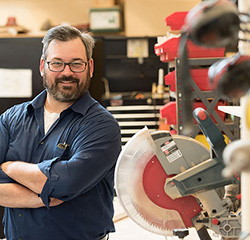News & Notices
Member Spotlight: Rich Dionne
 Q&A with Rich Dionne: Technical Director, Professor at Purdue University, and VC for Programming for USITTs Technical Production Commission.
Q&A with Rich Dionne: Technical Director, Professor at Purdue University, and VC for Programming for USITTs Technical Production Commission.
How did you get your start in technical theatre?
There was a girl when I was in college in theatre and I wanted to get to know her better so I got a job working in the scene shop. I kept going back. My major was English and I thought I was going to be an English professor. I got a master’s degree in English and even taught as an adjunct at a couple universities but found that I kept doing theatre.
Is that how you ended up at Purdue?
Absolutely. I knew early on in my life that I wanted to teach. I knew I was going to end up there eventually. The thing that kept drawing me back to theatre was I love storytelling and I also love tinkering around and making stuff. That made theatre a good match for me. I get to tell stories and I get to make stuff.
Tell me about your time at Shakespeare Theatre of New Jersey
I was there for about four years early in my career. When I finally left, I said to the artistic director there, “You must have been insane to hire me at age 26 to be the Production Manager with relatively little experience on my resume…I wouldn’t have done that if I were you.”
I lucked out in that it was the right position for me at the right time in my career and it was a great time of growth for me as well as the theatre.
We expanded to greater year-round operations and added an outdoor venue. I believe our production values increased. I learned a lot while I was there. I had background in sound design and technical direction but I was young. I learned about how good management skills are necessary. I dedicated my time there to learning systems and when I started at Purdue, that’s been a big part of my teaching.
What is the difference between working as a professional and working with students at Purdue?
The first thing that comes to mind is when I’m working professionally, the project I’m working on is the production and I think a lot in terms of project management and project work. When I’m a TD professionally or a sound designer professionally, the project I’m doing is the show.
When I’m at Purdue, the shows are a tool for the project I’m really working on, which is the student. I had to learn to willingly allow things onstage here that I might not allow professionally because it’s a good learning step for the student. They’re not going to know that it’s wrong until they see it and say, “Holy cr*p, that’s wrong.”
Of course, there are boundaries to that. Never do we put safety at risk onstage. A student may make a construction technique decision that I know is probably not the most efficient, the most cost effective, or the most quality controlled and I’ll talk to them about it. In the end if they’re the TD for the show that’s their call and I must let them do it. Sometimes that means that the shows may not always be the kind of quality work that I would put onstage professionally.
Because you have this dual role, as far as USITT goes, tell me about your role in the Institute
I have been attending USITT since 2000. During that time, I’ve been an attendee and a recruiter for both Shakespeare Theatre of New Jersey and Purdue. I’ve been a panelist and a chair of sessions and now I’m the outgoing Vice Commissioner of Programming and the incoming Associate Commissioner for the Technical Production Commission.
What brings you back to the Conference every year?
The biggest draw is the people I get to converse with and the networking. I meet new people each year and learn new things, make new connections, and renew old connections with colleagues who I consider good friends. The only time I get to see some of them is at the Conference.
There are sessions where I get to learn new things or learn techniques I didn’t know about and that’s always exciting for me. Plus, Stage Expo is an extravaganza of sights and sounds.
The Technical Production programming serves a variety of constituents. Last year we had a session roundtable called “Early Career and Student Roundtable” and it featured seven young professionals on the panel, most of whom were young women, all of whom were from different cultural backgrounds. The room was full of people like that. That was exciting and the energy was exciting and hopeful and that’s great. USITT is a great community, and I’m happy to be a part of it.
Suggest a USITT Member for the Spotlight!
If you know of USITT members whose work should be in the Spotlight, please feel free to suggest them. Contact Jenn Shuron at jenn@usitt.org.

